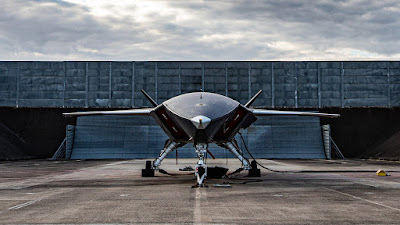Loyal Wingman aircraft (all photos : Boeing Australia)
Australia — Boeing Australia powered up the commercial turbofan engine on the first Loyal Wingman aircraft in September, as part of ground testing and preparations for first flight.
This milestone comes on the heels of Boeing completing the first unmanned Loyal Wingman aircraft for the Royal Australian Air Force earlier this year, a major step forward for the unmanned vehicle serving as the foundation for the global Boeing Airpower Teaming System, an artificial intelligence-powered teaming aircraft developed for the global defense market.
“This engine run gets us closer toward flying the first aircraft later this year and was successful thanks to the collaboration and dedication of our team,” said Dr. Shane Arnott, program director of the Boeing Airpower Teaming System. “We’ve been able to select a very light, off-the-shelf jet engine for the unmanned system as a result of the advanced manufacturing technologies applied to the aircraft.”
About Wingman
A wingman (or wingmate) is a pilot who supports another in a potentially dangerous flying environment. Wingman was originally the plane flying beside and slightly behind the lead plane in an aircraft formation.
According to the U.S. Air Force,
The traditional military definition of a "Wingman" refers to the pattern in which fighter jets fly. There is always a lead aircraft and another which flies off the right wing of and behind the lead. This second pilot is called the "Wingman" because he or she primarily protects the lead by "watching his back."
The wingman's role is to support aerial combat by making a flight both safer and more capable: amplifying situational awareness, increasing firepower, and allowing more dynamic tactics.[citation needed]
The concept of a wingman is nearly as old as fighter aviation. On 9 August 1915, Oswald Boelcke was already acting in the role when he shot down a French airplane pursuing Max Immelmann.
Colonel Robert Smith provided an extensive description of the work and role of wingmen during the Korean War. Among a wingman's primary responsibilities are remaining close to the leader of the aerial formation and warning the leader of any immediate threats at the cost of losing mutual protection. Smith described the responsibilities as mutually exclusive: to never lose the leader requires that the wingman watch what is in front of him/her while warning the leader of threats requires focusing on the rear. In order to protect the leader, the wingman needs to react constantly according to his surroundings and movements. Smith described the difficulties of flying under conditions of poor visibility and the trying effects on human perception under such conditions, especially considering the danger of becoming separated from the formation leader. According to Smith, wingmen are expected to remain with the leader, even at the cost of scoring an easy kill.


